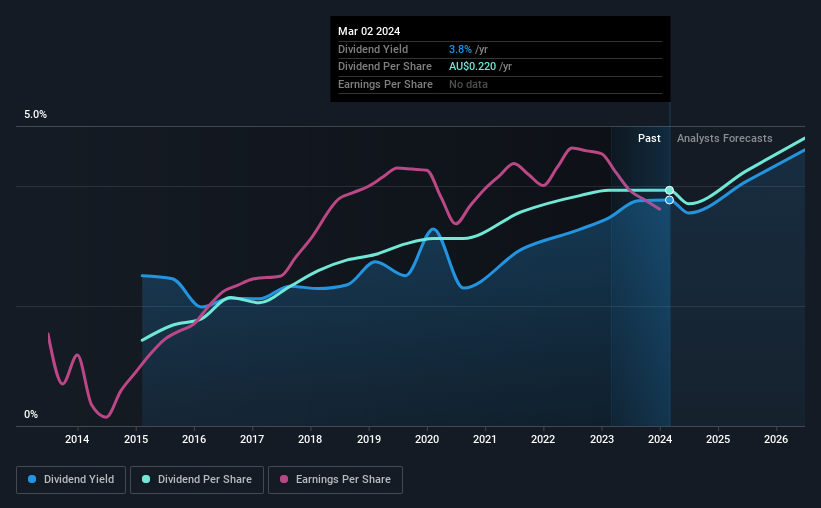Bapcor Limited (ASX:BAP) Goes Ex-Dividend Soon
Bapcor Limited (ASX:BAP) is about to trade ex-dividend in the next four days. The ex-dividend date is one business day before a company's record date, which is the date on which the company determines which shareholders are entitled to receive a dividend. It is important to be aware of the ex-dividend date because any trade on the stock needs to have been settled on or before the record date. In other words, investors can purchase Bapcor's shares before the 7th of March in order to be eligible for the dividend, which will be paid on the 28th of March.
The company's next dividend payment will be AU$0.095 per share, on the back of last year when the company paid a total of AU$0.22 to shareholders. Last year's total dividend payments show that Bapcor has a trailing yield of 3.8% on the current share price of AU$5.84. If you buy this business for its dividend, you should have an idea of whether Bapcor's dividend is reliable and sustainable. We need to see whether the dividend is covered by earnings and if it's growing.
Check out our latest analysis for Bapcor
Dividends are typically paid out of company income, so if a company pays out more than it earned, its dividend is usually at a higher risk of being cut. Bapcor paid out 73% of its earnings to investors last year, a normal payout level for most businesses. That said, even highly profitable companies sometimes might not generate enough cash to pay the dividend, which is why we should always check if the dividend is covered by cash flow. Fortunately, it paid out only 47% of its free cash flow in the past year.
It's encouraging to see that the dividend is covered by both profit and cash flow. This generally suggests the dividend is sustainable, as long as earnings don't drop precipitously.
Click here to see the company's payout ratio, plus analyst estimates of its future dividends.
Have Earnings And Dividends Been Growing?
Stocks with flat earnings can still be attractive dividend payers, but it is important to be more conservative with your approach and demand a greater margin for safety when it comes to dividend sustainability. If earnings fall far enough, the company could be forced to cut its dividend. That explains why we're not overly excited about Bapcor's flat earnings over the past five years. We'd take that over an earnings decline any day, but in the long run, the best dividend stocks all grow their earnings per share.
The main way most investors will assess a company's dividend prospects is by checking the historical rate of dividend growth. In the last nine years, Bapcor has lifted its dividend by approximately 12% a year on average.
Final Takeaway
Should investors buy Bapcor for the upcoming dividend? We're not enthused by the flat earnings per share, although at least the company's payout ratio is within reasonable bounds. Additionally, it paid out a lower percentage of its free cash flow, so at least it generated more cash than it spent on dividends. While it does have some good things going for it, we're a bit ambivalent and it would take more to convince us of Bapcor's dividend merits.
If you're not too concerned about Bapcor's ability to pay dividends, you should still be mindful of some of the other risks that this business faces. For example, we've found 1 warning sign for Bapcor that we recommend you consider before investing in the business.
A common investing mistake is buying the first interesting stock you see. Here you can find a full list of high-yield dividend stocks.
Have feedback on this article? Concerned about the content? Get in touch with us directly. Alternatively, email editorial-team (at) simplywallst.com.
This article by Simply Wall St is general in nature. We provide commentary based on historical data and analyst forecasts only using an unbiased methodology and our articles are not intended to be financial advice. It does not constitute a recommendation to buy or sell any stock, and does not take account of your objectives, or your financial situation. We aim to bring you long-term focused analysis driven by fundamental data. Note that our analysis may not factor in the latest price-sensitive company announcements or qualitative material. Simply Wall St has no position in any stocks mentioned.

